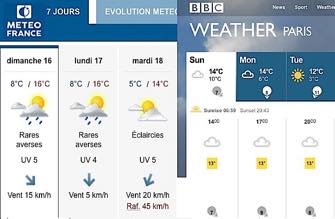
The first thing I do when I get up in the morning, after converting to a new religion so I can pray to a different god not to let France follow the United States and Britain down a political rabbit hole, is check the weather forecast. To get an idea of the temperature and thus what to wear, I alternate more or less randomly between two websites, Méteo France and BBC Weather.
I chose the former because it’s the national weather service of my adopted country, about which I admire virtually everything with few exceptions, and the latter because the Méteo France website is one of those exceptions. Its format is overloaded and hard to read, whereas the design of the BBC site is simple, intuitive and easy on the eyes.
And some days, just to keep my eyes on their toes, so to speak, I look at both. Which is how I noticed, starting a couple of years ago, that the British forecast very often gives a lower peak temperature for Paris than Méteo France.
In fact, this happens so often that I started to suspect that it might be a furtive form of French-bashing, which seems to be something of a tradition in the British media (as I have previously mentioned here and there), rather like the Oxford comma and relentlessly stalking younger members of the Royal Family in the wild hope of getting a telephoto shot of one of them naked.
Eager to get, like a tabloid paparazzo, to the bottom of the subject, I decided to take a formal, systematic approach and keep careful track of both sites’ predictions for a scientifically valid, statistically significant, or convenient period of time.
Then I decided to go with “convenient,” and limited my test period to one calendar week. During which my suspicions were confirmed: between April 10 and 16 of this year, the BBC’s projected high for Paris was at least one and often several degrees Celsius lower than the French forecast every single day.
Before I go on, here’s a special note for American readers who aren’t accustomed to Centigrade temperatures:
Hey, it’s easy to convert from Celsius to Fahrenheit! All you have to do is multiply the Centigrade temperature by nine, divide by five, add 32, and FINALLY LEARN THE FREAKING METRIC SYSTEM A FULL 42 YEARS AFTER IT WAS OFFICIALLY DECLARED THE “PREFERRED SYSTEM OF WEIGHTS AND MEASURES” FOR THE UNITED STATES, WHICH IS ONE OF ONLY THREE COUNTRIES IN THE ENTIRE WORLD YET TO CONVERT AND THE OTHER TWO ARE BURMA AND LIBERIA, FER CRIPESAKE.
Sorry to yell. Here’s a hint: 16°C is 61°F and one Centigrade degree equals nearly two (1.8) Fahrenheit degrees. Embrace it.
Now then, here are the figures for April 10-16, with the Méteo France predictions first, followed by the BBC forecasts:
Monday: 18 /16
Tuesday: 18 /16
Wednesday: 19 /18
Thursday: 18 /14
Friday: 18 /15
Saturday: 16 /15
Sunday: 16 /14
For comparison, I also kept track of the two sites’ predictions for London, which were:
Monday: 15 /15
Tuesday: 17 /16
Wednesday: 16 /16
Thursday: 15 /14
Friday: 16 /16
Saturday: 14 /15
Sunday: 14 /14
Overall in that week, the BBC predictions were a total of 15 Centigrade points colder than Méteo France’s for Paris, and the Méteo France predictions were one point warmer for London.
And it’s not because the French forecasters are overly optimistic: when I looked up the recorded actual highs in Paris, Méteo France was off by six points for the week and the BBC by nine.
Since the BBC has a reputation for being punctiliously accurate, I had to wonder: why the discrepancy specifically for Paris? Is the weather page sponsored by a sweater shop in the St Pancras Eurostar terminal?
The actual explanation is probably something simple and sensible. Maybe the British forecast is for Charles de Gaulle Airport, whereas Méteo France takes its measurements somewhere in town where the atmosphere is hotter, like the Sexodrome in Pigalle.
But since “simple and sensible” are no fun, I thought of something convoluted and ludicrous: what if this is part of a British counter-offensive to stymie Paris’s efforts to draw post-Brexit business away from London?
This is a real concern for the UK and already has the Paris authorities salivating and brushing up their Shakespeare. (Literally, and both at once: as a promotional gift, French Chamber of Commerce emissaries in London are handing out copies of As You Like It bound in spit-polished leather.)
So I investigated further, and found that the temperature is not the only thing being subtly downgraded by the British in an attempt to tarnish Paris’s image. Just this past week I received, from a source that can be described as “highly placed” (when I’m not lying down), a fact sheet about Paris intended for bankers and multinational executives in the City of London…
Facts at a Glance: Paris, France
General
Paris is the capital of the country of France, which isn’t all that much warmer than Britain despite being located to the south.
Its nickname, dating from the 19th century, when Paris became the first municipality in Europe to install street lamps, is “The City of a Dim Glow.”
Geography
Paris is traversed by the River Seine, which is pronounced “sane” in English but probably has a different meaning entirely.
The city is known for its lovely, majestic bridges, the oldest of which is called Pont Neuf, which means “New Bridge.” If they can’t keep simple facts like that straight, imagine what your first audit is going to be like.
History
From the French Revolution of the late 18th century through two world wars and the general strike of 1968, Paris has been the scene of frequent uprisings and insurrections that have toppled old regimes, leaving thousands of formerly powerful, wealthy people dead or destitute. But don’t let that worry you.
Culture
Paris is renowned for its many world-class cultural institutions, like the Louvre, the Pompidou Center and the Comédie Française, which is what they ought to call their labor regulations.
Over the years the city has been celebrated in numerous classic popular songs, including “I Kind of Like Paris,” “January in Paris” and “50 Million French(weather)men Can Be Wrong.”
The French capital is also a world fashion hub. Parisians are known for being stylish and well-dressed, but this is largely an undeserved stereotype. For example, it’s true that you see a lot of people in Paris wearing scarves even on warm spring days, but most of them are British tourists.
Language
In compliance with local custom, the French speak French, which is a language that is slowly evolving into English, as indicated by this ad poster:

We give it another 10 years. But in the meantime you’ll still have to gargle your r’s and send half your vowels through your nose. Be sure to pack plenty of Kleenex.
Transportation
For urban rapid transit, Paris has the “Métro,” a fast, efficient underground train network. Which is a good thing, because the traffic around Étoile makes the Omaha Beach landing look quiet and orderly. Just in case you were thinking about moving there with a car.
Infrastructure
Office space is plentiful in Paris, but apartments are expensive and difficult to find. Most new arrivals prefer to live in one of the outlying suburbs, like Calais or London.
Paris’s most famous monument is the Eiffel Tower, which was, no kidding, sold for scrap metal twice in 1925 and the con man, Victor Lustig, was never arrested for it. In contrast, London Bridge was sold fraudulently twice by a scam artist named Michael Corrigan, who was arrested for it, and then legitimately to an American zillionaire in 1967. This is indicative of the British capital’s healthier business climate.
The largest public building in the Paris region is the Stade de France, an enormous stadium built for the FIFA World Cup of 1998, when France beat Brazil in the final but still came in second. Somehow.
Social/dating scene
You think the weather is cold? Hah!
The next new C’est Ironique will appear on May 3.
FavoriteAn album of David Jaggard’s comic compositions is now available for streaming on Spotify and Apple Music, for purchase (whole or track by track) on iTunes and Amazon, and on every other music downloading service in the known universe, under the title “Totally Unrelated.”
Note to readers: David Jaggard’s e-book Quorum of One: Satire 1998-2011 is available from Amazon as well as iTunes, iBookstore, Nook, Reader Store, Kobo, Copia and many other distributors.
